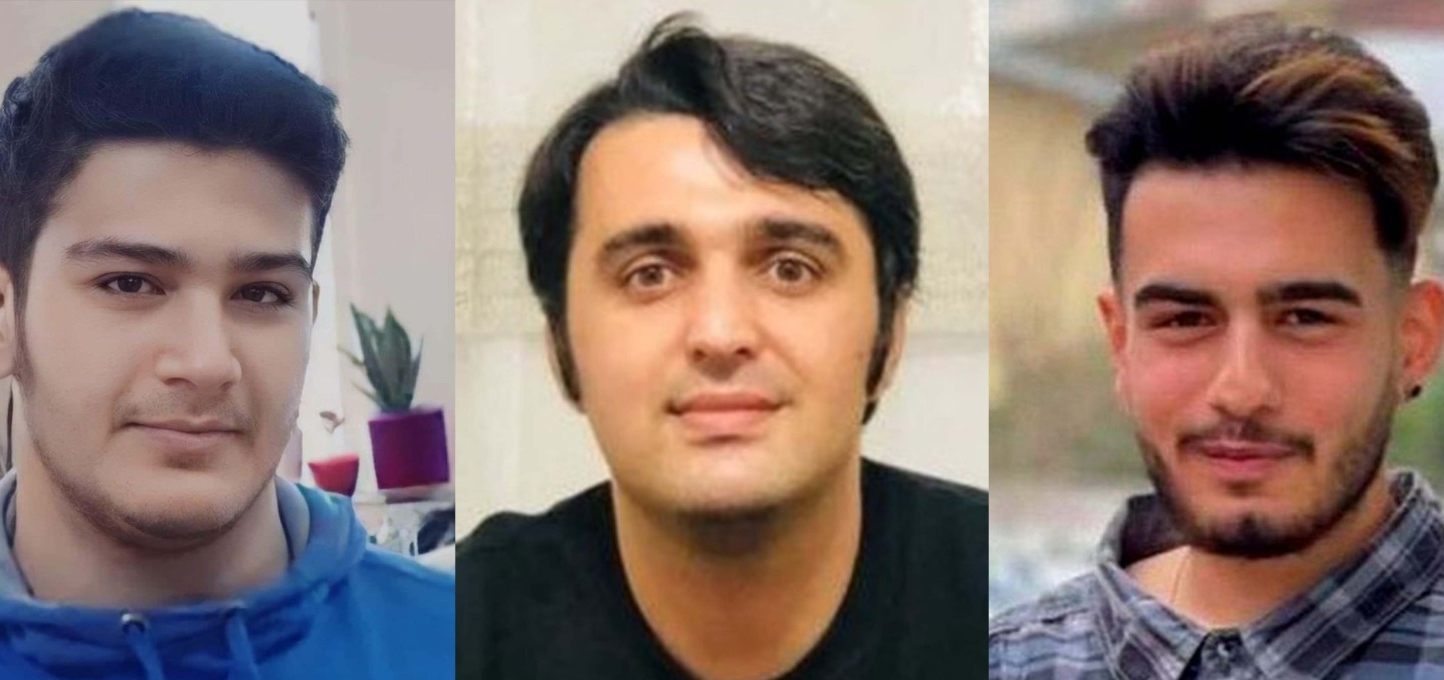The Iranian authorities must immediately quash the unjust convictions and death sentences of three young protesters who were subjected to gruesome torture including floggings, electric shocks, being hung upside down and death threats at gunpoint, Amnesty International said today. The organization learned that Revolutionary Guards agents raped one of them and sexually tortured another by placing ice on his testicles for two days.
Arshia Takdastan, aged 18, Mehdi Mohammadifard, aged 19, and Javad Rouhi, aged 31, each received two death sentences in December 2022 for “enmity against God” (moharebeh) and “corruption on earth” (efsad-e fel arz). The court stated that the young men “incited…widespread” arson or vandalism by dancing, clapping, chanting or throwing headscarves into bonfires during protests in Noshahr, in northern Manzandaran province on 21 September 2022. Javad Rouhi received a third death sentence for “apostasy” based on his “confessions” under torture that he burned a copy of the Quran during protests. The men’s appeal is before the Supreme Court.
“The fact that Arshia Takdastan, Mehdi Mohammadifard and Javad Rouhi and their anguished relatives live under the shadow of execution while Revolutionary Guards agents and prosecution officials reasonably suspected of responsibility or complicity in their sexual abuse and other forms of torture enjoy absolute impunity highlights the sheer cruelty and inhumanity of Iran’s judicial system,” said Diana Eltahawy, Amnesty International’s Deputy Director for the Middle East and North Africa.
“The Iranian authorities must immediately quash the convictions and death sentences of these young men and drop all charges related to their peaceful participation in protests. They must also order a prompt, transparent and impartial investigation to bring all those reasonably suspected of responsibility for their torture to justice in fair trials.”
Weeks of harrowing torture
Javad Rouhi was arrested on 22 September 2022 and held for more than 40 days in solitary confinement at a Revolutionary Guards detention centre known as Shahid Kazemi, which is located within Tir Kola prison in Sari, the capital of Manzandaran province. According to information obtained by Amnesty International, during this period, he was subjected to severe beatings and floggings while being tied to a pole, including on the soles of his feet, shocked with stun guns, exposed to freezing temperatures, and sexually assaulted by having ice put on his testicles. Revolutionary Guards agents repeatedly pointed a gun at his head and threatened to shoot him if he did not “confess”. As a result of this torture, Javad Rouhi suffered shoulder and muscular injuries, urinary incontinence, digestive complications and mobility and speech impairment. He continues to experience severe pain in his back and hips and numbness in his right leg, which require specialist medical care unavailable in prison.
“It is abhorrent that while the majority of the world’s states have consigned the death penalty to history, the Iranian authorities are increasingly imposing it for offences such as arson or vandalism, in gross violation of international law.
Diana Eltahawy, Amnesty International
According to informed sources, during Mehdi Mohammadifard’s arrest on 2 October 2022, Revolutionary Guards severely beat and pushed him to the ground, as a result of which he sustained a broken nose. Amnesty International has learned that following his arrest, he was held for a week in solitary confinement in a cell infested with mice and cockroaches, and during this period, he was subjected to severe beatings, hung upside down, and raped, leading to anal injuries and rectal bleeding, which required hospitalization.
Arshia Takdastan was arrested on 24 September 2022 and held in solitary confinement at Shahid Kazemi detention centre for 28 days. According to Amnesty International’s research, he was subjected to beatings and death threats, including having a gun pointed at his head if he did not “confess” in front of a video camera”. Interrogators also threatened to detain and torture his father. As a result of this torture, he sustained a broken toe and experienced memory loss.
Gross violations of fair trial rights
All three men were denied access to a lawyer during the investigation phase, and access to a lawyer of their choosing at trial, which consisted of a single hearing lasting under an hour for each.
The Revolutionary Court in Sari stated in its verdicts, which Amnesty International reviewed, that the young men “incited…widespread” arson or vandalism by dancing, clapping, chanting or burning headscarves. For Javad Rouhi and Arshia Takdastan, the prosecution provided no evidence of their involvement in such acts. The court solely relied on their torture-tainted “confessions” of forcibly entering and throwing items from a traffic police booth in Javad Rouhi’s case; and throwing stones and a glass bottle toward a police car and blocking a road in Arshia Takdastan’s case. The court also cited Javad Rouhi’s “confession” that he warned other protesters against entering the governor’s office and claimed that this proves his “leadership”. Javad Rouhi maintained in court that his participation in the protests was peaceful.
For Mehdi Mohammadifard, the prosecution similarly cited his “confessions” of setting fire to state buildings and a video clip purportedly showing him throwing Molotov cocktails into the same traffic police booth. His lawyer stated in court that the clip does not prove that he provoked or participated in widespread arson and that his “confessions” were obtained under coercion.
“It is abhorrent that while the majority of the world’s states have consigned the death penalty to history, the Iranian authorities are increasingly imposing it for offences such as arson or vandalism, in gross violation of international law. We urge the international community to take all necessary measures to pressure the Iranian authorities to end their violation of the right to life. We further urge all states to exercise universal jurisdiction over all Iranian officials reasonably suspected of criminal responsibility for crimes under international law and other grave violations of human rights,” said Diana Eltahawy.
Amnesty International opposes the death penalty in all cases without exception; the death penalty is the ultimate cruel, inhuman and degrading punishment.






















